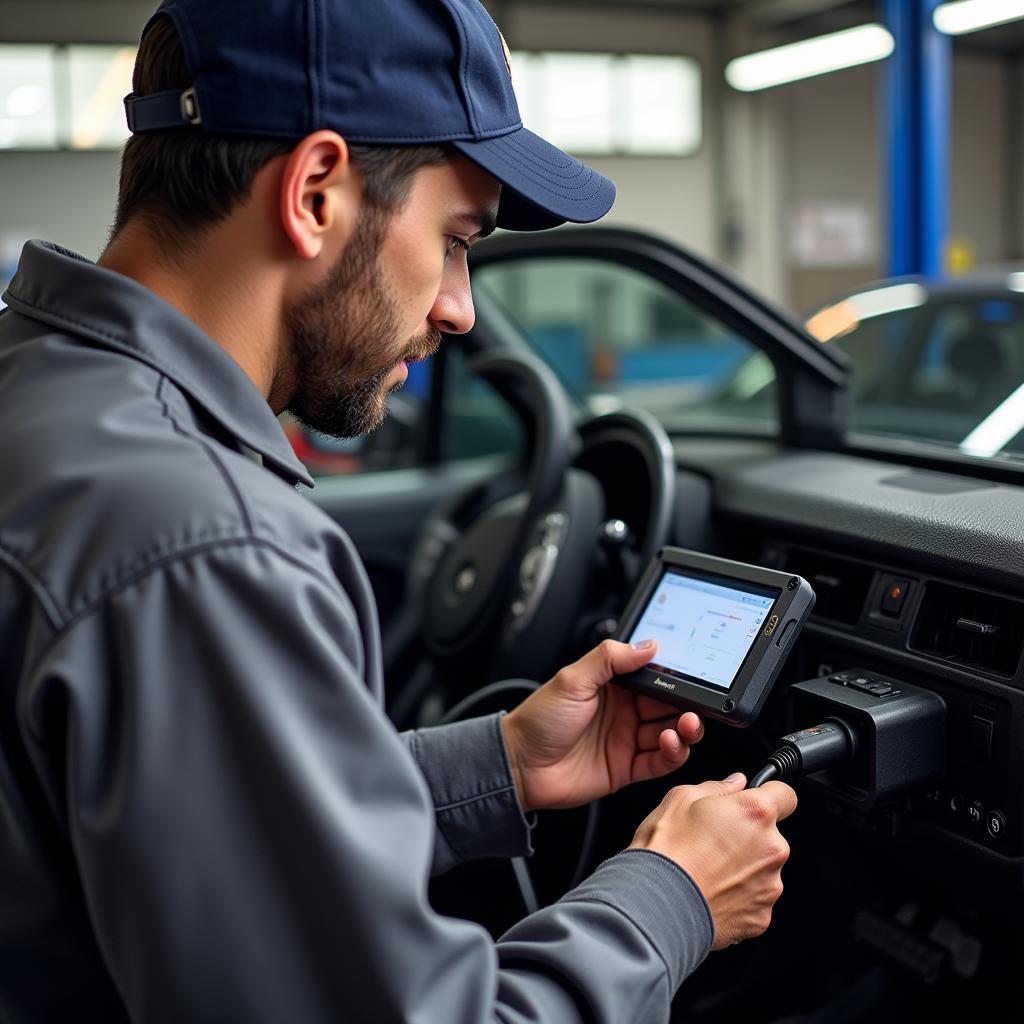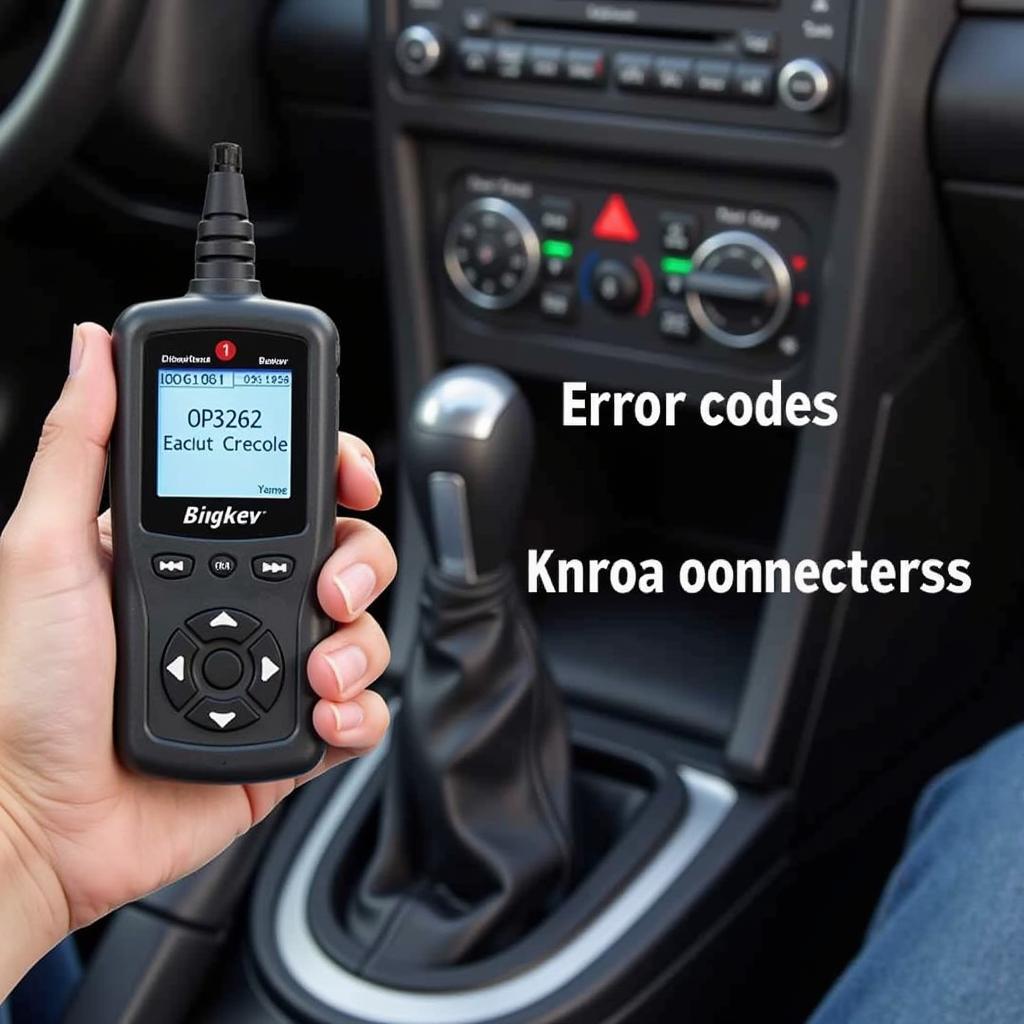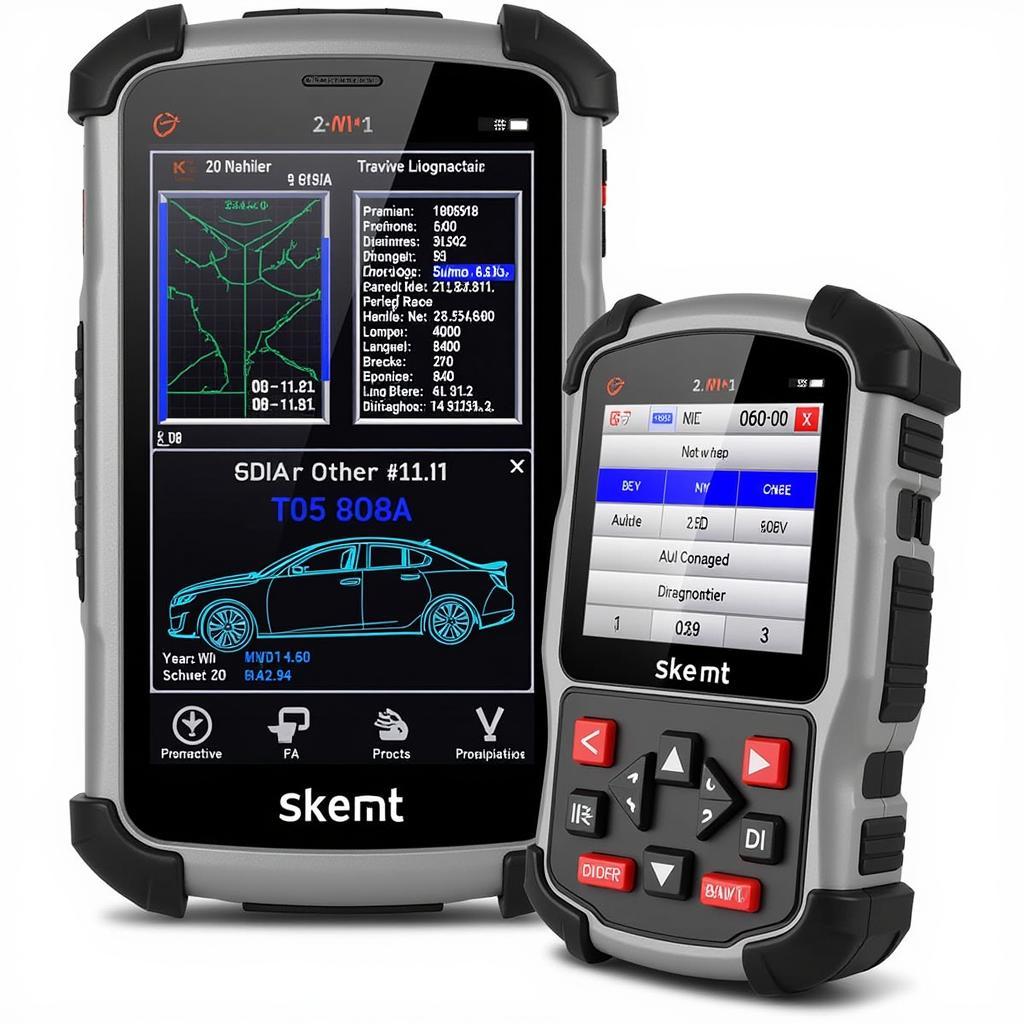A Car Diagnostic Machine has become an essential tool for mechanics and car enthusiasts alike. As vehicles become increasingly complex, with intricate electronic systems controlling everything from engine performance to safety features, the need for accurate and efficient diagnostics has never been greater. These machines, also known as OBD2 scanners, allow you to tap into your vehicle’s computer system, retrieve diagnostic trouble codes (DTCs), and gain insights into the health of your car.
Why is a Car Diagnostic Machine Important?
 Mechanic Using a Diagnostic Machine on a Car
Mechanic Using a Diagnostic Machine on a Car
Gone are the days of relying solely on mechanical intuition and visual inspections to diagnose car problems. Modern vehicles generate a wealth of data, and a car diagnostic machine acts as the key to unlocking this treasure trove of information. Here’s why these devices are indispensable:
- Accurate Diagnosis: By reading DTCs, you can pinpoint the root cause of warning lights on your dashboard, such as the check engine light, ABS light, or airbag light. This eliminates guesswork and saves you time and money on unnecessary repairs.
- Preventative Maintenance: Regularly scanning your car with a diagnostic machine allows you to identify potential issues before they escalate into costly repairs.
- Enhanced Understanding: For car enthusiasts and DIY mechanics, these machines provide a deeper understanding of how their vehicles operate. You can monitor engine parameters, track fuel efficiency, and even customize certain vehicle settings.
Types of Car Diagnostic Machines
The market offers a wide array of car diagnostic machines, ranging from basic code readers to professional-grade scan tools. Choosing the right one depends on your needs and budget:
1. Basic Code Readers:
 Basic OBD2 Code Reader for Cars
Basic OBD2 Code Reader for Cars
These affordable and user-friendly devices are ideal for car owners who want to read and clear basic DTCs. They are limited in functionality and cannot access advanced diagnostic information.
2. Advanced OBD2 Scanners:
A step up from basic code readers, these scanners offer a wider range of features, including live data streaming, graphing capabilities, and the ability to perform some actuation tests.
3. Professional-Grade Scan Tools:
 Professional Car Diagnostic Scan Tool
Professional Car Diagnostic Scan Tool
Used by professional mechanics and dealerships, these comprehensive tools offer the most advanced diagnostic capabilities, including module coding, programming, and access to manufacturer-specific data.
Choosing the Right Diagnostic Machine
With so many options available, selecting the right car diagnostic machine can be daunting. Consider the following factors:
- Your Skill Level: If you’re a casual user, a basic code reader or an advanced OBD2 scanner might suffice. Professional mechanics require the comprehensive capabilities of professional-grade scan tools.
- Vehicle Compatibility: Ensure the machine you choose is compatible with your car’s make, model, and year. Most modern vehicles use the OBD2 standard, but older models might require specialized adapters.
- Features and Functionality: Determine the specific features you need, such as live data streaming, bi-directional controls, or manufacturer-specific diagnostics.
- Budget: Prices vary significantly depending on the type of machine and its features. Set a budget beforehand to narrow down your options.
“Investing in a reliable car diagnostic machine is like having a personal mechanic on call 24/7,” says John Smith, a veteran automotive technician with over 20 years of experience. “It empowers car owners to take control of their vehicle’s maintenance and diagnose problems accurately.”
The Future of Car Diagnostics
The evolution of automotive technology continues to shape the landscape of car diagnostics. As vehicles become increasingly interconnected and reliant on software, we can expect to see even more sophisticated diagnostic tools emerge. Trends such as remote diagnostics, cloud-based data analysis, and predictive maintenance are poised to revolutionize the way we care for our cars.
Conclusion
A car diagnostic machine is an invaluable tool for anyone who owns or works on cars. Whether you’re a seasoned mechanic or a car enthusiast, these devices provide the insights and information needed to keep your vehicle running smoothly. By embracing this technology, you can diagnose problems accurately, perform preventative maintenance, and gain a deeper understanding of your car. For those seeking to explore their options, you can find a wide variety of car diagnostic scanners at buy diagnostic car scanner.
FAQs
- Can I use a car diagnostic machine on any car?
Most modern cars manufactured after 1996 are equipped with the OBD2 standard, making them compatible with most diagnostic machines. However, it’s crucial to check the machine’s compatibility with your specific car’s make, model, and year.
- What is the difference between OBD and OBD2?
OBD stands for On-Board Diagnostics. OBD2 is the second generation of this standard, introduced in 1996, which provides a standardized system for accessing diagnostic information from a vehicle’s computer.
- Will using a car diagnostic machine void my car’s warranty?
No, using a car diagnostic machine will not void your car’s warranty. You are legally allowed to use these devices to access your vehicle’s diagnostic information.
- Can I fix my car myself using a diagnostic machine?
While a diagnostic machine can help you identify the problem, it’s essential to have the necessary skills and knowledge to perform repairs. If you’re unsure about a repair, it’s always best to consult a qualified mechanic.
- How often should I scan my car with a diagnostic machine?
It’s recommended to scan your car at least once a year or whenever you notice unusual performance issues or warning lights on the dashboard.
- Where can I get help interpreting diagnostic trouble codes?
Many online resources, forums, and repair manuals offer detailed information about DTCs. You can also consult a qualified mechanic for assistance.
Still have questions?
For further assistance and expert advice on car diagnostics, feel free to contact us via WhatsApp: +1(641)206-8880 or Email: [email protected]. Our dedicated team of car diagnostic specialists is available 24/7 to provide you with personalized support and address any concerns you may have.

Leave a Reply